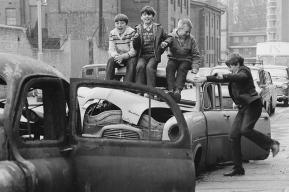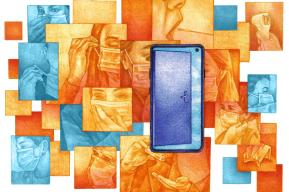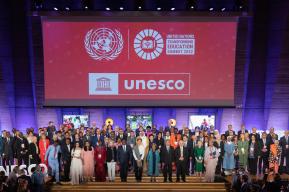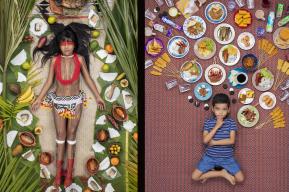فكرة
الجائحة، مرآةٌ لهشاشة أوضاعنا

لقد أزاحت الأزمة الصحية السّتار عن التصدّعات والشّروخ التي تشقّ مجتمعاتنا، من عنف قائم على الجنس، وظروف سكن مزرية، وضعف الأنظمة الصحية. وإذا ما أردنا تغيير هذا العالم، فعلينا أن نرفع التحدّيات التي لم نتمكّن من مواجهتها حتى الآن.
كالبانا شارما
صحافية مستقلة، ومُعلّقة، وكاتبة، مقيمة في مومباي. آخر مؤلّفاتها: الصمت والعاصفة: سرديّات العنف ضد المرأة في الهند.
لو تأمّلنا مليّا في الأفق لأمكننا رؤية قاربِ صيدٍ صغيرٍ بالعين المجرّدة، وأدركنا، وقتها، أن شيئًا ما قد تغيّر. فالسّحابة الرّمادية الخانقة، التي تعوّدنا عليها، قد اختفت، والهواء أصبح نقيّا، واستعادت السماء تلك الزّرقة التي نسينا وجودها.
العالم تغيّر في هذا العام من 2020. فيروسٌ جديدٌ جعل كوكبنا يختنق بكل ما في الكلمة من معنى. ففي كل يوم يتعاظم الشكّ، وتتضاعف العدوى، ويرتفع منسوب القلق بخصوص مَواطن الشّغل وتدهور الوضع الاقتصادي أمام مرض لم يوجد له (حتى الآن) أي علاج.
لا شيء كان يجعلنا مستعدّين لهذا الوضع غير المتوقّع. بيد أنه إذا كان هناك من درس مستفاد فهو أنّ الدول التي قامت بالاستثمار اللاّزم لتمكين مواطنيها من الاستفادة من رعاية صحية متاحة، يسهل الوصول إليها، هي اليوم الأكثر جاهزية لمواجهة هذه الأزمة الصحية.
كان مؤمّلا، بالنّظر إلى طبيعة هذا الفيروس الجديد القاتل والسريع العدوى، أن تتّحد الدول والشعوب لمحاربته. لكن الذي حدث هو العكس حيث كشفت الأزمة عن الشروخ التي تَشُقّ مجتمعاتنا.
خطوط الشّرخ
في حين أن الفيروس لا يختار ضحاياه، فإن مجتمعاتنا تعيد إنتاج المظاهر القديمة للتمييز تجاه "الآخر"، سواء بسبب اختلاف الدين أو العرق. وعوض أن تساهم الجائحة في محو الكراهية والأفكار المسبقة فإنّها زادت، للأسف، في تفاقمها.
أمّا الشّرخ الآخر فهو عدم المساواة. فالأزمة الحالية مكّنت من الوقوف، أكثر من أي وقت مضى، على ما سمّاه رجل الاقتصاد الفرنسي توماس بيكيتي "عنف اللاّمساواة". فالناس القابعون في أسفل السلّم، والمحرومون من كلّ حماية اجتماعية، يكافحون من أجل البقاء أمام هذه الجائحة العالمية.
في الهند أخذ "عنف اللاّمساواة"، في الأشهر الأخيرة، شكلًا مأساويًا جرّاء الحجر الصحي المفروض على جميع السكان، أي 1.3 مليار شخص، حيث تُرك الآلاف من الرجال والنساء إلى مصيرهم، يهيمون دون سند في المدن التي هاجروا إليها بحثًا عن العمل بعد أن فقدوا شغلهم مع توقّف الاقتصاد. ونظرا لحرمانهم من أي دخل أو ضمان، لم يبق لهم من خيار سوى العودة مشيا على الأقدام إلى قراهم التي تبعد مئات الكيلومترات.
هذه المسيرة القسرية في طقس حارّ، مع القليل من الطعام والماء، قضت على العديد منهم ولم ينجو سوى القليل. ولعلّ صور مسيرة المهاجرين الريفيين أفضل شاهد على أنّ النماذج غير العادلة للتنمية الاقتصادية لا يمكنها، في حالات طوارئ صحية مثل هذه، سوى أن تزيد من معاناتهم.
ويتمثّل الشرخ الثالث، الذي يشقّ كافة المجتمعات، ويصبح صارخا في أوقات الأزمات بالخصوص، في التفاوت بين الجنسين. فقد اضطرّت العديد من النساء إلى الالتزام بالحجر الصحي صحبة المعتدين عليهنّ، نظرا لأنّ الوضع لا يُوفّر لهن الكثير من سبل الهروب. وهي ظاهرة لا تحظى، للأسف، بالاهتمام الذي تستحق، ولعلّها تُفسّر بأنه طالما يحدث هذا الانتهاك لحقوق ملايين النساء عبر العالم، على نحو "طبيعي"، في الأوقات "العادية"، فـعاديّ أكثر أن يحدث أوقات الأزمة!
الفقر الحضري
في العديد من الدول، كان الفيروس أكثر فتكا في المدن. فالمساكن المُكتظّة، والتي كثيرا ما تكون غير صحيّة، كانت ملائمة لانتشار المرض. كما أن رداءة البنية التحتية للصحة العموميّة قلّصت من حظوظ النجاة من الوباء بالنسبة للأشخاص الذين يعيشون في مثل هذه الظروف وخاصة في البلدان الأكثر فقراً.
هؤلاء الرجال والنساء، الذين يعملون في قطاع الخدمات، والبناء، والصناعات الصغرى، وكمُعينات منزليّة، وغيرها من القطاعات الأخرى، يُمثّلون عماد مدننا. وأغلبهم يتقاضى أجراً زهيدا ويعيش في مناطق حضرية فقيرة مكتظة بالسكان، وغير مزوّدة بمياه الشرب، وتشكو من نقص فادح في شبكات الصّرف الصحي.
في مثل هذه الأوضاع، يستحيل مراقبة انتشار الفيروس، ويصبح التّباعد الجسدي، بحكم ضيق الفضاء لا معنى له. كما أن نقص المياه الجارية يجعل من إجراءات النّظافة، مثل غسل اليدين المتكرّر وتطهير الأسطح، أمرًا مستحيلاً.
إن مسألة المساكن الاجتماعية قلّما مثّلت أولوية في مدننا. وها نحن نُشاهد اليوم العواقب من خلال الأعداد المهولة للحالات الجديدة المسجّلة في عدد من الأحياء الأكثر فقرا داخل المدن، سواء كانت في مومباي أو نيويورك.
بشرى مخادعة
صحيح أن تقرير الطاقة العالمي لسنة 2020، وهو التقرير الرئيسي لـوكالة الطاقة الدولية الذي صدر في أبريل، يتوقع انخفاضًا قياسيًا في انبعاثات الكربون بحوالي 8٪ هذه السنة. وهو خبر سارّ دون ريب. إلا أنه يمثّل نتيجة سعيدة لأزمة تعيسة، وليس نتيجة إجراءات في مكافحة الأخطار الحقيقية لتغيّر المناخ.
لقد غيّر فيروس كورونا أشياء كثيرة في حياتنا، ولم يُغيّر، في نفس الوقت، أي شيء. فلا شيء ينبئ بأننا، بمجرّد انتهاء هذه الأزمة، سوف لن نستأنف العيش بنفس الطريقة التي كنّا نبذّر بها مواردنا. وقليلة هي المُعطيات التي تدلّ على وجود مخططات ملموسة لإعادة تنظيم مدننا بشكل دائم يتيح للفقراء، مثلا، إمكانية العيش الكريم، أو منح الأولويّة للنقل العمومي الصديق للبيئة.
تنتظرنا تحديات عديدة بدءًا بالإصلاح العميق لأنظمتنا الصحية. فالبلدان والدول الفدرالية والمقاطعات التي سجّلت أفضل النتائج في هذه الأزمة هي تلك التي استثمرت في نظام صحّي عام عالي الجودة.
ويتمثّل ثاني التحديات في معالجة أوجه عدم المساواة المتأصلة في مجتمعاتنا، لأن أفضل النُّظُم محكوم عليها بالفشل في مجتمع غير متكافئ. ويتطلّب الأمر مشروعا طويل المدى لا يمكن تحقيقه، طبعا، بين عشية وضحاها. إلا أنّه طالما تواصل التّفاوت في النّظام القائم، وسواء كان اقتصاد الدولة قويًا أو ضعيفا، فإن الأزمات ستأتي على الضّعفاء وعلى أصحاب الأوضاع الهشّة قبل غيرهم.
وكما قال المهاتما غاندي: "هناك ما يكفي في العالم لتلبية احتياجات الإنسان، ولكن ليس هناك ما يكفي لإشباع جشعه". فالجشع هو الذي يغذّي اقتصاداتنا بعد أن فقدت الحدود فعاليتها أمام الأطماع الاستهلاكية العالمية. وهو الذي يهدّد، أيضا، مستقبل كوكبنا بالتهامه الموارد الطبيعية دون أن يُعوّضها.
لقد أجبرَنا فيروس كورونا على إبطاء النّسق. ولكن، هل سنشهد، بعد تجاوز الأزمة، ظهور نظام عالمي جديد؟ وهل سندرك هشاشة وضع الملايين منا؟ وهل سنُنصت إلى أصوات النساء والسكان الأكثر ضعفا حال عودة ضجيج النشاط البشري؟
لا توجد إجابات بسيطة على هذه الأسئلة. لكن حان وقت طرحها. كما حان الوقت لنُدرك أن اختفاء السماء الزرقاء ليس أمرا حتميا.
قراءات تكميلية
تحديات مناخية، تحديات أخلاقية، رسالة اليونسكو، يوليو-سبتمبر 2019
هذه المدن التي تُجدّد نفسها، رسالة اليونسكو، أبريل-يونيو 2019
العدالة والكرامة، رسالة اليونسكو، أكتوبر-ديسمبر 2011
غداً : اقتصاد انساني، رسالة اليونسكو، سبتمبر 2000
تحديات التحضر في دول الجنوب، رسالة اليونسكو، يونيو 1999
طفرات الكراهية، رسالة اليونسكو، مارس 1996
الإعلام عن العنف ضد الفتيات والنساء: دليل للصحفيين، اليونسكو، 2019
اشترك في رسالة اليونسكو لمتابعة الأحداث. الاشتراك في النسخة الرقمية مجاني 100%.
تابع رسالة اليونسكو على تويتر، فايسبوك، أنستغرام
By Kalpana Sharma
When you can spot the speck of a fishing boat on the horizon with your naked eye, you know that something has changed. The usual suffocating brown cloud has lifted. The air is clear. And the sky is a blue that you have forgotten.
The world has changed in 2020. A new coronavirus has literally knocked the air out of the world. Each day brings greater uncertainty, more news of death and infection, and increasing anxiety about jobs and the economy as we battle a disease that has no cure – yet.
Nothing can prepare you for the unexpected. But if there is one lesson to be learned, it is that those countries that invested in affordable and accessible health care are today best equipped to deal with an unexpected health crisis.
Given the nature of this new virus – contagious, deadly and swift – one would have expected nations, and people within nations, to come together to fight it. Instead, tragically, we have watched how COVID-19 has laid bare the existing fault-lines in all our societies.
Fault-lines exposed
At a time when a virus is not choosy about who it infects, our societies continue to discriminate against their own people on the basis of age-old entrenched attitudes towards the ‘other’ – be it people from another religion or another race. A pandemic cannot erase hate and prejudice; tragically, it tends to exacerbate them.
Another fault-line exposed is inequality. We can watch what the French economist Thomas Piketty terms “the violence of inequality” playing out in this crisis. Those at the bottom, without a safety net, are also the very people now struggling to stay afloat during this global pandemic.
In India, this “violence of inequality” has played out in a heartbreakingly vivid manner in the spring of 2020, as a nation of 1.3 billion people was locked down to stem the spread of COVID-19. Thousands of men and women – left adrift in cities where they had migrated, looking for work and sustenance – lost their jobs when the economy ground to a halt. With no money or safety net, they were left with no alternative but to set out on foot, walking hundreds of kilometres to reach their homes in the countryside.
They trudged in the heat, with little food and water. Some survived, but many died on the way. The images of this exodus of rural migrants are testimony to how unjust patterns of economic development elevated their suffering in the event of such an emergency.
The third fault-line that runs through every society, but jumps out at times of crisis, is that of gender. Women are “locked down” with their abusers, with few avenues of escape. Yet this phenomenon is not getting the attention it deserves. Could it be because this gross violation of the rights of millions of women across the world occurs even in so-called “normal” times?
Urban poverty
In many countries, COVID-19 has struck hardest in urban areas. The disease has spread rapidly among the urban poor, who live in congested, often unhygienic, conditions. The chances of the people living in such conditions surviving this pandemic are slim – given the poor public health facilities, especially in most poorer countries.
These people literally hold up our cities – the conservancy workers, those in the service industry, in construction, in small-scale industries, domestic help, caregivers, and many more. Most of them are poorly paid and live in dense urban poor settlements, where there is no running water and inadequate to non-existent sanitation.
In such settlements, the spread of COVID-19 cannot be controlled by way of physical distancing – because the urban poor have no space to escape each other. The lack of running water makes hygiene measures such as frequent hand-washing and disinfecting surfaces impossible.
Affordable housing has rarely been a priority in our cities. The consequence is what we are witnessing today. The overwhelming number of new infections have occurred in some of the most densely-packed and poorer parts of cities – whether in Mumbai or in New York.
A whiff of good news
And finally, coming back to clean air in our cities. The Global Energy Review 2020, the flagship report of the International Energy Agency (IEA) released in April, noted a record annual decline in carbon emissions of almost eight per cent this year. This is good news. Except that it is a fortunate fallout of an unfortunate crisis, and not the result of addressing the very real dangers of climate change.
COVID-19 has changed many things, yet changed nothing. But once this crisis passes, there is little to indicate that things will not return to the old, profligate ways of living. We have seen little evidence of any concrete plans to permanently reorder our cities, for instance, so that the poor can live with dignity, or where eco-friendly public transport is prioritized.
There are many challenges ahead, starting with the fundamental overhaul of our health-care systems. Countries, and states and provinces within countries, that have come out well in this crisis are those that have invested in quality public health.
The second is addressing the embedded inequities in our societies. Even the best systems fail in an unequal society. This is a long-term project, for sure, and cannot be addressed overnight. Irrespective of whether we live in countries with strong or weak economies, if there is systemic inequality, it will manifest during crises – by killing those who are already impaired and vulnerable.
“The world has enough resources for everyone's needs, but not for everyone’s greed,” Mahatma Gandhi once said. Yet, it is greed that has fuelled our economies – as borders and boundaries have lost relevance in the global fervour to satiate consumerist appetites. It has also threatened the future of the planet, as natural resources are devoured, never to be replaced.
COVID-19 has compelled us to slow down. But as and when we succeed in overcoming this particular crisis, will we witness a new world order? Will we recognize the precarious existence of millions among us? Will we hear the voices of the women, and the most vulnerable, once the noise of business-as-usual begins?
There are no easy answers. But we can, and must, ask. And, perhaps, hope.
Kalpana Sharma
Independent journalist, columnist and author, based in Mumbai. The Silence and the Storm: Narratives of violence against women in India is her most recent book.

In the same issue








